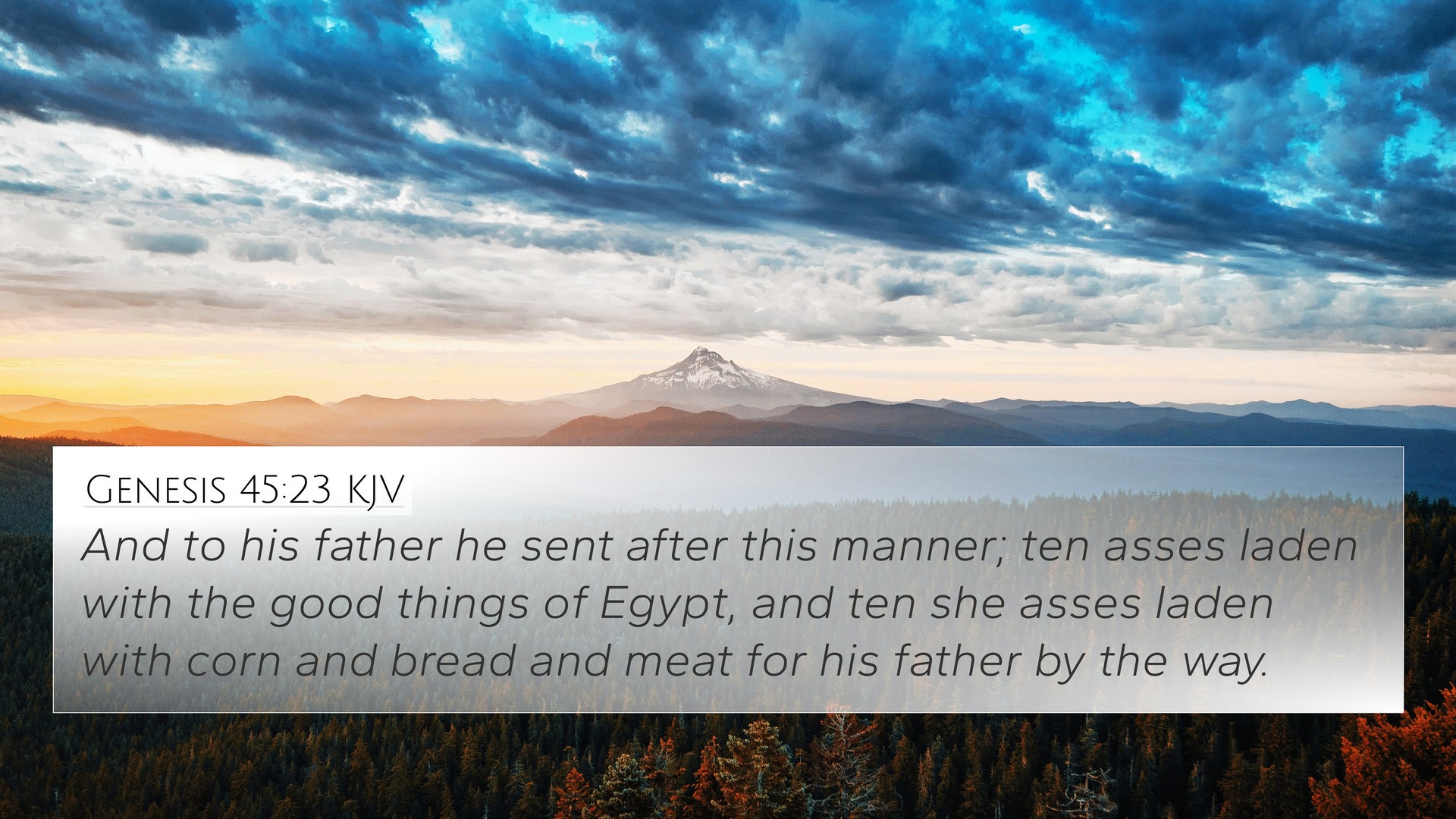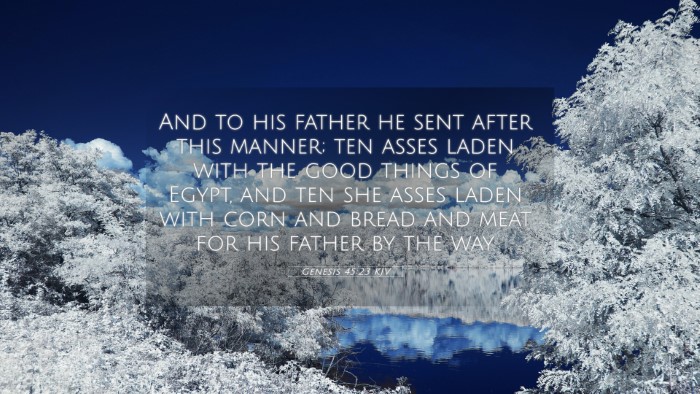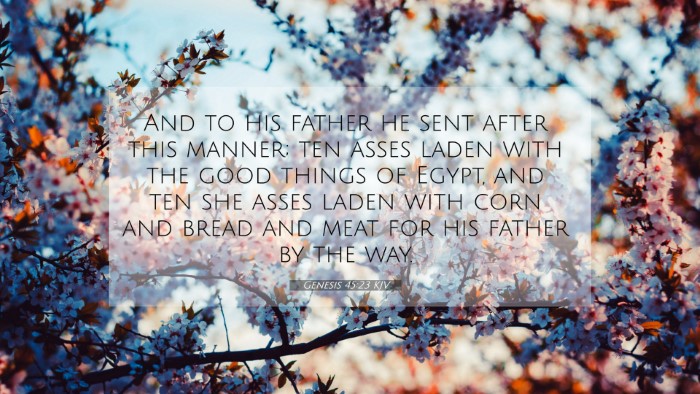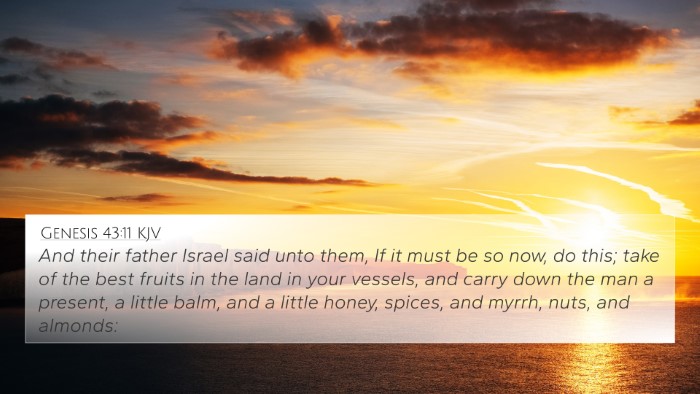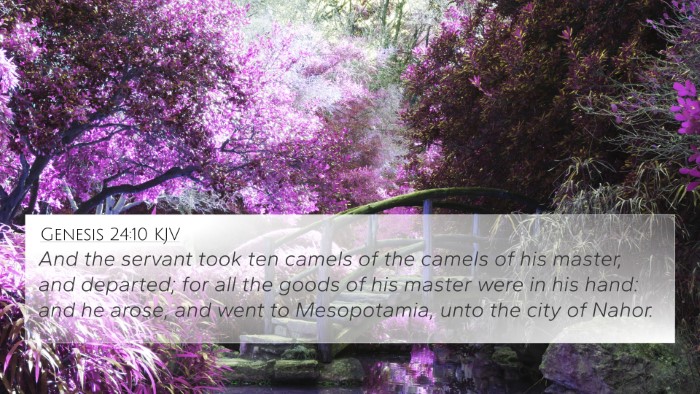Understanding Genesis 45:23
Genesis 45:23 states, “And he sent the following ten donkeys loaded with the good things of Egypt, and ten female donkeys loaded with grain, bread, and provisions for his father on the journey.” This verse occurs during a pivotal moment in the narrative of Joseph's reconciliation with his brothers after years of separation and hardship.
Verse Breakdown
The verse reflects not only Joseph’s generosity but also his desire to provide for his family, specifically for his father Jacob.
- The Gifts: The ten donkeys symbolize abundance, delivering goods from Egypt—a land synonymous with prosperity during this time.
- Significance of Load: Each animal carries essentials for sustenance, highlighting the importance of both physical and emotional nourishment in familial relationships.
Commentary Insights
The interpretations provided by various commentators such as Matthew Henry, Albert Barnes, and Adam Clarke offer valuable insights into the verse's meaning:
- Matthew Henry: Discusses Joseph's generosity, indicating that his gifts were manifestations of love and forgiveness, reiterating the theme of reconciliation within the entire narrative of Joseph.
- Albert Barnes: Elaborates on the notion that Joseph's actions demonstrate the balance of authority and compassion; Joseph, now a ruler, uses his position to care for his family, showcasing a heartfelt connection that transcends previous betrayals.
- Adam Clarke: Emphasizes the representation of the “good things of Egypt” as not just material goods but also spiritual significance, suggesting that Joseph is providing not merely for survival, but for a restoration of dignity to his family.
Thematic Connections
This verse can be related to several themes and passages throughout the Bible, illustrating the connections between different texts:
- Genesis 37:28: Joseph's brothers initially sold him into slavery, setting the stage for their later reconciliation.
- Genesis 41:57: The famine that brought Joseph’s family to Egypt highlights God's providence and Joseph's rise in status.
- Exodus 3:21-22: The gifts sent by Joseph can be compared to God’s direction to the Israelites to borrow valuables from the Egyptians before the Exodus.
- Luke 15:20-24: The Prodigal Son’s return and the father’s embrace provide a poignant parallel illustrating themes of forgiveness and redemption.
- Romans 8:32: Just as Joseph generously provided for his family, this verse reminds believers that God, in His love, gives generously to His children.
- 1 John 3:18: Emphasizes the importance of actions that demonstrate love, akin to Joseph’s gift-giving as an expression of his feelings towards his family.
- Hebrews 11:21: This passage looks back on Jacob's blessings over his sons, drawing a rich lineage connecting to the fulfillment of Joseph’s role.
Cross-Referencing Biblical Texts
Identifying these cross-references enhances one's understanding of the Scriptures. They offer a deeper examination of the interconnectedness of the Bible, highlighting the relevance of Genesis 45:23 beyond its immediate context:
- Genesis 42:6 - Joseph's position of authority versus his brothers’ initial fear.
- Matthew 5:42 - Jesus’ teaching on giving to those who ask illuminates Joseph’s actions.
- 2 Corinthians 9:7 - The concept of cheerful giving reflects Joseph's spirit of generosity.
Applying the Verse to Daily Life
In our lives today, this verse can inspire acts of kindness and the importance of nurturing familial bonds. It serves as a reminder that generosity and support should be extended to those we love, particularly in times of need.
Conclusion
Genesis 45:23 exemplifies reconciliation, provision, and the continuation of familial support. It illustrates the power of forgiveness, restoration, and love within families. As you reflect on this passage, consider how it connects to other Biblical themes of redemption and divine providence, engaging in a comparative Bible verse analysis to enrich your understanding of the Scriptures.
